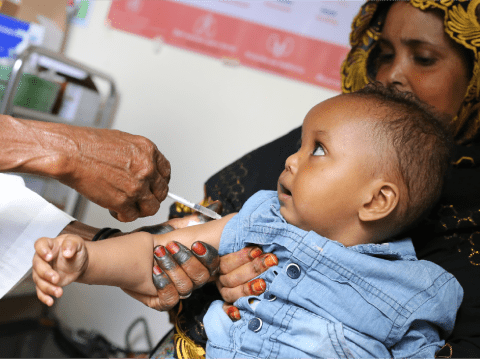Gabiley Mother & Child Health (MCH) Centre: A guide to healthy pregnancy

Rooda Ismaaciil (35) lives in Laakbarako, Gabiley District, Somaliland. She is a mother of three children; nine-month-old Abdiqani being the youngest one. Like others in her communities, Rooda has realised the importance of postnatal care and vaccination for her child. Protecting her child from something that is preventable was never an option in her mind. Although the pain from the actual vaccination shot may last a few minutes, not to mention the several trips to the health centre being tedious, the lifetime peace of mind and protection makes it all worth it.
During her pregnancy period, Rooda was proactive in ensuring that she attended all prenatal sessions at Gabiley MCH Centre. This was to ensure that her health, and that of her baby, was progressing well. In addition to medical care, she would also receive education on pregnancy and childbirth, as well as counselling and support. After the baby was born, she continued with her postnatal sessions and attending the health centre for her child’s routine immunisation, according to Somaliland health guidelines.
“I used to come to this health centre every appointed time to check on my pregnancy progress. I attended both antenatal and postnatal care sessions in this health facility. We enjoy good relations with the caregivers and today I brought Abdiqani to get his second immunisation of Pentavalent vaccine and oral Polio vaccine.” Rooda says.
Faadumo Mustafa, a mother of two-month-old Ahmed, also visited the MCH centre to get her baby’s second vaccine. She had been here a month ago for the first vaccine shot. Faadumo delivered at the facility and completed all of her antenatal care visits during her pregnancy trimester.
Miss Asha Abdi Ali, who’s in charge of the health facility commended Faadumo for giving her child the best chance to live by being keen to follow all sessions.
“This young woman (Faadumo) was the best; she was committed to her visits, and she delivered in this health facility", says Asha. "Her husband is a casual labourer, and some days she could not get any support from him. Despite that, she came on time to the health facility for every appointment.”
Vaccinations not only protect a child from deadly diseases, but they also keep other children safe by eliminating or significantly decreasing deadly diseases that can easily be transmitted from one child to another. Childhood immunisation can be overwhelming to a new parent, especially in challenging contexts such as Somaliland. Life-saving health services are often far from reach; making newborns, children, and mothers especially susceptible. This makes health risks for children in places such as Somaliland, even higher.
World Vision is taking a comprehensive approach to address such challenges. With support from The Dutch Relief Alliance (DRA), the organisation ensures that these critical services remain free and accessible to every expectant mother and those who have given birth in Gabiley District. In addition, World Vision supports Gabiley MCH Centre with health workers’ incentives, medical drugs, cleaning materials and water supply. World Vision also constructed latrines and incinerators.
Mothers and children attending Gabiley MCH Centre have access to free medical services and are also attended to by health workers trained by World Vision. This gives them an economic advantage over their counterparts in private hospitals who have to incur high costs, of which most vulnerable households can’t afford. Mothers who visit the MCH centre, are also taken through health education awareness with a special focus on the importance of exclusive breastfeeding for the first six months of a child’s life, as well as the importance of a mother and child’s hygiene.
“Before I knew about this MCH centre, I used to visit private hospitals. There, the costs were high, and I was not able to pay for the services because of my economic situation. Now, I get free medicines and services from the MCH centre thanks to the support of World Vision”, concludes Rooda.
Faadumo further adds, “When I came to this MCH facility, the health staff were concerned about my wellbeing and that of my unborn baby. They also shared information that I used during my pregnancy period. I learnt a lot about pregnancy and life after pregnancy.”